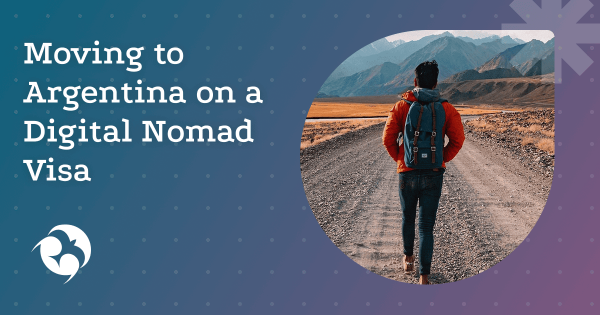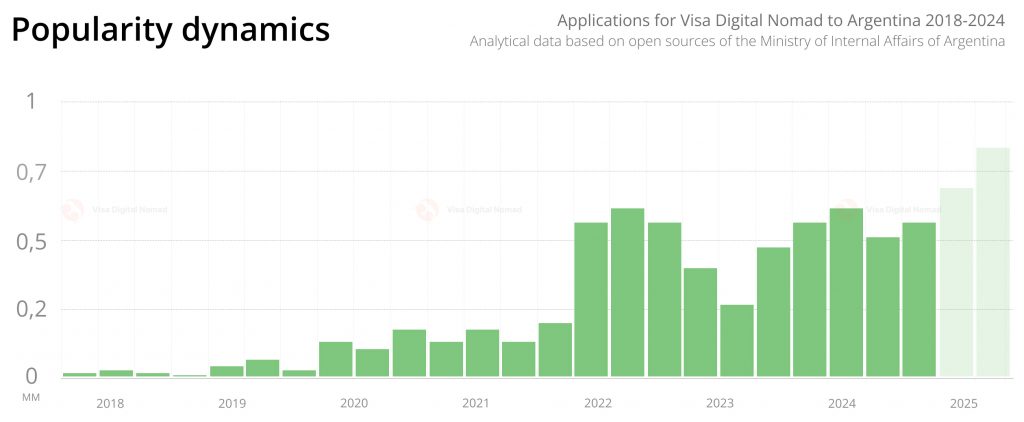My name is Evgeny, and I am from Russia. I work in the field of digital marketing and am employed by a French IT company. In 2023, I spent a long time searching for a residency for remote workers and moving with a digital nomad visa with the prospect of obtaining citizenship. Argentina was one of the top countries on the shortlist. Weighing all the pros and cons, I arrived in the Latin American country in January 2024 on a Nomadas Digitales visa and managed to adapt to my new life.
Many people ask how to get it quickly and move. You can handle the paperwork yourself, but it’s more reliable to enlist professional support. That’s what I did. Opening the Digital Nomad visa was no problem. Within 1.5 months, I was already flying to Buenos Aires. The most challenging part of this story was packing my bags and the flight. The journey to the other end of the world took two days.
Migration Laws of the Country
In a short time, I managed to look around and form an opinion about the country. I have much time ahead to study the culture. The visa allows me to stay legally in the country for six months and extend the term to a year. It is available to employees of Russian or foreign companies who provide information and telecommunications services remotely.
According to the Ministry of the Interior of Argentina, more than a million freelancers and self-employed people have come to the country under this program in two years. Most of them are IT specialists. Nomads are engaged in website development, graphic design, programming, and launching startups. The entrepreneurial Russian diaspora is growing rapidly here, as is the number of realtors assisting in finding apartments. Many of them consider residency for obtaining citizenship after changing their basis.
People with a monthly income of 406 USD are eligible for rentier visas, and financially secure foreigners can become investors by contributing 1.5 million pesos to the treasury. Relocators with modest earnings look for vacancies in the local market and extend their stay through work contracts. The migration service website (Migraciones) lists the grounds for granting residence permits. Finding offline employment is challenging even for Argentinians. It’s easier to find a remote job online. Foreigners are treated well here, and specialists in high-demand professions are valued.
Reasons for Choosing Argentina
I see relocation as an opportunity to change my life and find a place in the sun. For now, I plan to extend my nomad visa for a year. I may change my status and apply for citizenship. A second passport opens borders for visa-free entry to 169 countries worldwide. Other reasons to stay in the country:
- rental cost;
- social benefits;
- prospects;
- tax policy;
- climate;
- expat community.
Economy and Money
When I chose Argentina, the economic factor was a priority, but I couldn’t foresee the changes. The country is catching up with Europe in terms of living costs. The most surprising thing was the dollar exchange rate. The official rate restrains the rapidly rising currency rate, while the dollar blue reflects the real financial situation.
Exchanging on the black market is advantageous for nomads earning in foreign currency. They legally exchange cash in “cuevas” (caves). Lists are published online. I found a couple of cuevas on Tripadvisor. I only took cash for the first few months. Now it’s more profitable for me to transfer euros via Western Union to a bank card from another country and receive pesos at the unofficial rate. I invest part of my funds in stable cryptocurrencies, exchanging them for dollars at Argentine crypto exchanges with a 3.5-4% commission.
The food in restaurants and cafes is delicious. Despite the rising prices and the locals’ low salaries (average 500 USD), the venues are always full. During holidays, due to the tourist influx, hotels are fully booked, and plane tickets must be purchased in advance. Rent has increased due to the influx of foreigners, which is typical for countries with a large flow of nomads. Expenses for one person, excluding rent, amount to about 500 USD. I rent a small studio for 400 USD. The price for a two-room apartment in the city center is rapidly approaching 1,000 USD.
Advantages of the Country
When evaluating Argentina as a place for relocation, I have no complaints. The country’s popularity is confirmed by statistics from Google Trends and Yandex and Wordstat for the first four months of 2024. The number of queries related to obtaining digital nomad status has increased by 50%. Key preferences:
- no age restrictions for obtaining residency;
- exemption from tax payments;
- opportunity to study at a local university;
- discounts on coworking spaces;
- access to healthcare and social benefits;
- a variety of cultural/historical attractions;
- the ability to travel to nearby countries;
- high approval rate of applications;
- the ability to develop a business within MERCOSUR – the union of Latin American countries.
I also like the climate here. There are no abrupt seasonal changes from heat to cold. Throughout the year, the temperature ranges from 15-25 °C. Argentina is not a beach country. It is more suitable for those who love nature, hiking, excursions, and entertainment. During my four-month stay, I have seen the ocean shore in Mar del Plata, which reminded me of the beach in Gelendzhik, and the mountains of Córdoba. Now, I plan to see the glaciers with whales and go on an excursion to the tropical forest and Iguazu Falls.
I haven’t sought medical help yet, but friends in the community note that it is provided for free and is of good quality. Friends with children who have permanent resident status praise the educational programs. Students mostly study at the state’s expense. The cost of commercial education is affordable for families with an average income.
Visa Application Process
First, I studied the law on the official website. All the introductory provisions are specified in six articles of the regulatory framework from 2022. It states that the transit residence for nomads is created based on Art. 24 of Law 25.871 — Migraciones with a limited legal status. According to Art. 2, freelancers must provide a document in Spanish, apostilled at the embassy, to obtain the status:
- Application form;
- Passport, photo 4×4 cm;
- Work contract;
- Proof of work experience;
- Salary statement;
- Health insurance;
- Receipt of state duty payment;
- Police clearance certificate.
When obtaining the visa at home for the first six months, proof of income was not required. I was told that a certificate of a minimum amount of 2,500 USD is requested when extending the visa for another six months. On the advice of a migration lawyer, I attached a letter in Spanish where I explained my activities, a recommendation, and, for credibility, a link to the company’s website.
Document Submission Requirements in Argentina
Regardless of the grounds for extending the visa and obtaining a residence permit, you need to gather a standard dossier:
- Passport with a border stamp, valid for at least six months from the date of entry;
- Police clearance certificate;
- Criminal record certificate from Russia, valid for three months;
- Proof of residence from the police department;
- Receipt of state duty payment.
Next Steps
To extend the visa and change status in Argentina, I need to register in the RaDEX migration management system:
- Fill out the online application;
- Pay the fee;
- Attach scanned documents according to the type of residence;
- Receive a letter with the interview time;
- After the interview at the migration service, provide fingerprints.
Cost
Processing residency at the Argentine consulate costs 150 USD, while online applications in the country cost 120 + 80 USD. Residency extension costs 4,000 pesos. Changing tourist status costs 30,000 pesos. Citizens of MERCOSUR member countries pay 1.5 times less.
What Should Foreigners Know?
The digital nomad visa is classified as a non-immigrant residency. It does not grant a DNI (identity card). This complicates finding cheap housing, opening a bank account, and accessing the Argentine payment system MercadoPago. After a year of stay, relocators who decide to stay can apply for temporary residency and a temporary DNI. They can also apply for permanent residency (permanente) and an unlimited term card.
Candidates for residency and citizenship are prohibited from leaving the country. This decision helps the authorities avoid granting status to foreigners not considering Argentina for permanent residence. Therefore, Precaria (temporary permit) and freelancer visas are issued for short periods with the possibility of one extension. Continuous stay in the territory increases the chances of a positive decision by the migration service. In case of refusal, foreigners can appeal or apply for residency on humanitarian, religious, political, and other grounds.
Next month, I need to submit documents to extend my Nomadas Digitales Visa. To avoid handling the paperwork myself and avoid common mistakes, I will delegate the process to a migration lawyer. This will minimize risks, save nerves and time. I hope my relocation story will help many decide on a relocation country and prepare psychologically.













